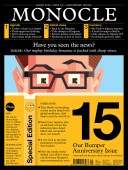
Issue 151
Monocle is 15 and our bumper March issue is a special edition packed with the kind of in-depth independent reporting that has made us a fixture of newsstands the world over. We assess how the media landscape has changed since we launched in 2007 and get right up to date with long reads on the Paris terror trial, South Korea’s burgeoning cultural scene, the new business frontier in the US and much more. Let’s celebrate.
In This Issue
Oops! No content was found.
Looks like we no longer have content for the page you're on. Perhaps try a search?
Return Home

